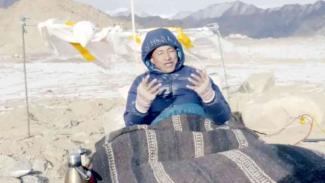Ladakh, nested high in the freezing Himalayas, has been facing a lot of heat for a while. Climate change is warming the entire earth and it is affecting Ladakh too. In addition, there is growing political heat. The tribal identity of Ladakh is facing a severe threat under the current political circumstances. The policies and decisions that are adversely affecting Ladakh are being made unilaterally and elsewhere; the people of Ladakh have little scope to participate in the decision-making and planning process.
In 2019, the union government under Narendra Modi abolished Article 370 of the Constitution, which had given special status to Jammu and Kashmir. Furthering the politics of polarization and minority hatred was the sole purpose behind the move. At that time, prominent activists of Ladakh like Sonam Wangchuk were under the illusion that the abolition of Article 370 could open the way for Ladakh’s betterment by ending the decades-long neglect. Today it is clear that the abrogation of Article 370 has not only destroyed Jammu and Kashmir’s autonomy and statehood, but it has also laid the foundation for Ladakh’s destruction.
The residents of Ladakh are now fighting an uphill battle to save their identity and their culture, and to protect the delicate ecology of this region from tourists and resource-sharks. The union governments “integration” plan has led to an unprecedented tourist influx. During the tourist season, the local people are getting outnumbered by visitors. Large quantities of land have been taken over to build military infrastructure. That has angered people.
The union government is all set to systematically exploit the natural resources in this area. There are plans to establish more than seven hydropower projects. Many industrial groups have shown interest in mining minerals like borax, gold, granite, chalk, and marble. Preparations are underway to clear 157 hectares of forest land for the installation of power transmission lines. The residents of Ladakh are realizing that this kind of development will benefit only a few industrialists who have no connection with the region, its culture and ecology. It will spell disaster for this area and its people.
Renowned activist Sonam Wangchuk fasted for 21 days under the open sky in the bitter cold from March 26, in order to draw attention to the impending disaster, and to voice the demands of Ladakh. Wangchuk and other protesters in Ladakh also allege that Chinese encroachment is continuing unabated in Ladakh. They are complaining that nomadic pastoralists are losing their prime pasture land to heavy industrial factories in the south and to Chinese encroachment in the north.
A protest march till Changthang on the China border was called on 7 April, in order to draw attention to Chinese encroachment. The Ladakh administration deployed heavy police and security forces in the area, imposed Section 144 and disrupted internet services, to prevent the march from taking place.
Such insensitive and authoritarian strategies of the administration compelled the Leh apex body (LAB) leaders, who led the movement along with the Kargil Democratic Alliance, to postpone the march. While announcing the postponement, they said that the government had turned the area into a war zone. “This government is behaving like a mad elephant, completely unconcerned with the security of the nation, the sentiments of the people and their problems”, the LAB leaders remarked.
The most important demands of the Ladakh movement are autonomy for Ladakh, status of a separate state, and inclusion of Ladakh in the Sixth Schedule of the Constitution.
The people of Ladakh are fighting to protect their democratic rights and the nature, environment and ecology of the region. But apart from undertaking vague and empty talks with them, the Modi government is not ready to grant any concessions to the people of Ladakh. That is why Sonam Wangchuk has asked what right the government has to call India the mother of democracy when it has willfully abrogated Ladakh’s democratic rights and is keeping it under the control of bureaucrats from Delhi? Isn’t the government behaving like the stepmother of democracy, especially in the case of Ladakh, Wangchuk asks.
Ladakh’s fight against the capitalist predatory model of development is a fight to save not only the Himalayas – from Ladakh to Joshimath. It is part of the fight to save the entire country from the havoc wrought by this model; it is a fight to protect nature, environment and ecology of the whole country. Their struggle is an integral part of India’s struggle to defeat fascism, and to save and strengthen democracy.










